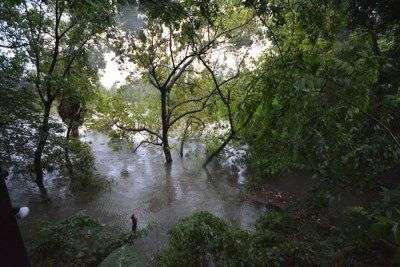
Scientists “credit” human-induced global warming with causing many marine and terrestrial wildlife species — such as the chamois mountain goat of the Italian alps — to become scrawnier with each successive generation. Credit: Fulvio Spada, FlickrCC
Dear EarthTalk: Was Hurricane Harvey caused by global warming? —Tom Dell, Bern, NC
The short answer is no. No single hurricane or weather event can be directly linked to the general phenomena known as climate change. “Climate change does not cause things, because climate change is not a causal agent,” writes David Roberts on Vox.com. “‘Climate change’ is a descriptive term — it describes the fact that the climate is changing.”

While global warming didn’t cause Hurricane Harvey, it certainly played a role in how extreme the storm was in terms of high winds and heavy rain. Credit: Texas.713, FlickrCC.
That said, global warming likely did contribute to the severity of Harvey, and has created an overall climate more hospitable to the formation of extreme weather events of every stripe. “For hurricanes, we would ask the question as to what are the possible hurricane developments in the world we live in and compare that to the possible hurricane developments in a world without climate change,” Dr Friederike Otto from the University of Oxford tells BBC News.
One definite “fingerprint” of global warming on Harvey is the intensity and amount of rainfall. Climatologists cite the Clausius-Clapeyron equation (a hotter atmosphere holds more moisture: for every extra degree Celsius in warming, the atmosphere can hold 7% more water) as one link between global warming and stronger storms. Houstonians have witnessed a 167 percent increase in the frequency of the most intense downpours since the 1950s.
Adam Sobel of Columbia’s Initiative on Extreme Weather and Climate estimates that as much as 10% of Harvey’s rainfall could be blamed on global warming, while Kevin Trenberth of the U.S. National Center for Atmospheric Research pegs the number at closer to 30%. “It may have been a strong storm, and it may have caused a lot of problems anyway—but [human-caused climate change] amplifies the damage considerably,” Trenberth reports in The Atlantic.
We’re also heating up our seas. “The waters of the Gulf of Mexico are about 1.5 degrees Celsius warmer above what they were from 1980-2010,” reports Sir Brian Hoskins from the Grantham Institute for Climate Change. “That is very significant because it means the potential for a stronger storm is there.”
Meanwhile, even the fact that Harvey hung around so long and dumped rain on and around southeast Texas for nearly four days suggests a climate connection: A recent report from climate scientist Michael Mann suggests that near-stationary summer weather patterns are more common in a warmer world.
But others think we are focusing too much on the climate underpinnings of Harvey. Ilan Kelman of University College London’s Institute for Risk and Disaster Reduction tells the BBC that the real human contribution to the catastrophe in Houston is more about the type of development we allow than about the emissions we are pumping skyward.
“The hurricane is just a storm, it is not the disaster,” says Kelman. “The disaster is the fact that Houston population has increased by 40% since 1990 [and] that many people were too poor to afford insurance or evacuate.” He adds: “Climate change did not make people build along a vulnerable coastline so the disaster itself is our choice and is not linked to climate change.”

